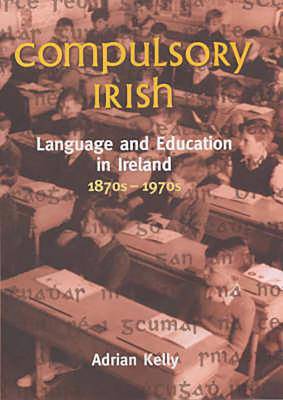
- Afhalen na 1 uur in een winkel met voorraad
- Gratis thuislevering in België vanaf € 30
- Ruim aanbod met 7 miljoen producten
- Afhalen na 1 uur in een winkel met voorraad
- Gratis thuislevering in België vanaf € 30
- Ruim aanbod met 7 miljoen producten
Zoeken
€ 68,45
+ 136 punten
Uitvoering
Omschrijving
Compulsory Irish was the major factor in moulding the education system of independent Ireland and this work, which draws on previously unused files from Government departments, is the first detailed account of the effects the compulsory Irish policy had on the education system and the status of the language. Adrian Kelly examines the rationale behind the introduction of compulsory Irish and the ever increasing emphasis on it in the curriculum of the primary (national) schools and at second and third levels. The volume examines the extent to which the policy, which had its genesis in the pre-independence cultural nationalist movements, was not based on the needs of the education system but rather on the demands of nationalism. During the period it was acknowledged that the revival policy was detrimental to the achievement of pupils, but this was seen as an acceptable price to pay for the revival of Irish. The volume also argues that the ill-founded policy damaged the dignity of the language and, while achieving little or nothing in practical linguistic terms, resulted in apathy and at times hostility towards Irish among the general public. Apart from highlighting the clash between the demands of nationalism and the role of the education system, the volume examines the extent to which criticism of the compulsory Irish policy was stifled. This in turn ensured that the effect of compulsion on the education system and the levels of attainment of pupils was never scientifically examined - to carry out such an examination would have been seen as an admission of failure. It was only in the 1960s that there was an official acceptance that Irish would not be revived as the national language in practice, the policy of 'revival' being replaced with that of survival, a change which began to be reflected in the schools from the 1970s.
Specificaties
Betrokkenen
- Auteur(s):
- Uitgeverij:
Inhoud
- Aantal bladzijden:
- 160
- Taal:
- Engels
Eigenschappen
- Productcode (EAN):
- 9780716526933
- Verschijningsdatum:
- 1/01/2002
- Uitvoering:
- Hardcover
- Formaat:
- Genaaid
- Afmetingen:
- 164 mm x 239 mm
- Gewicht:
- 435 g

Alleen bij Standaard Boekhandel
+ 136 punten op je klantenkaart van Standaard Boekhandel
Beoordelingen
We publiceren alleen reviews die voldoen aan de voorwaarden voor reviews. Bekijk onze voorwaarden voor reviews.








